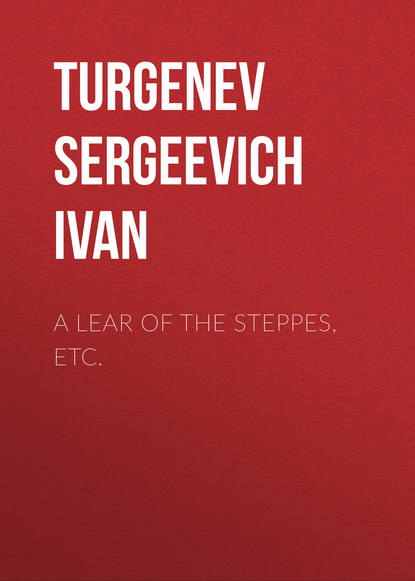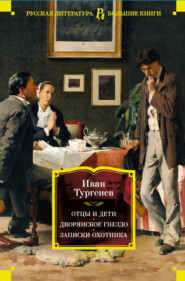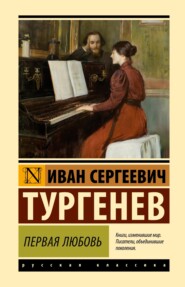По всем вопросам обращайтесь на: info@litportal.ru
(©) 2003-2024.
✖
A Lear of the Steppes, etc.
Настройки чтения
Размер шрифта
Высота строк
Поля
XXI
When next morning I began to approach the little house I knew so well, I was struck with one circumstance; all the windows in it were open, and the door too stood open; some bits of paper were lying about in front of the doorway; a maidservant appeared with a broom at the door.
I went up to her…
‘They are gone!’ she bawled, before I had time to inquire whether Gagin was at home.
‘Gone?..’ I repeated. ‘What do you mean by gone? Where?’
‘They went away this morning at six o’clock, and didn’t say where. Wait a minute, I believe you’re Mr. N – , aren’t you?’
‘I’m Mr. N – , yes.’
‘The mistress has a letter for you.’ The maid went upstairs and returned with a letter. ‘Here it is, if you please, sir.’
‘But it’s impossible … how can it be?..’ I was beginning. The servant stared blankly at me, and began sweeping.
I opened the letter. Gagin had written it; there was not one word from Acia. He began with begging me not to be angry at his sudden departure; he felt sure that, on mature consideration, I should approve of his decision. He could find no other way out of a position which might become difficult and dangerous. ‘Yesterday evening,’ he wrote, ‘while we were both waiting in silence for Acia, I realised conclusively the necessity of separation. There are prejudices I respect; I can understand that it’s impossible for you to marry Acia. She has told me everything; for the sake of her peace of mind, I was bound to yield to her reiterated urgent entreaties.’ At the end of the letter he expressed his regret that our acquaintance had come to such a speedy termination, wished me every happiness, shook my hand in friendship, and besought me not to try to seek them out.
‘What prejudices?’ I cried aloud, as though he could hear me; ‘what rubbish! What right has he to snatch her from me?..’ I clutched at my head.
The servant began loudly calling for her mistress; her alarm forced me to control myself. One idea was aflame within me; to find them, to find them wherever they might be. To accept this blow, to resign myself to such a calamity was impossible. I learnt from the landlady that they had got on to a steamer at six o’clock in the morning, and were going down the Rhine. I went to the ticket-office; there I was told they had taken tickets for Cologne. I was going home to pack up at once and follow them. I happened to pass the house of Frau Luise… Suddenly I heard some one calling me. I raised my head, and at the window of the very room where I had met Acia the day before, I saw the burgomaster’s widow. She smiled her loathsome smile, and called me. I turned away, and was going on; but she called after me that she had something for me. These words brought me to a halt, and I went into her house. How can I describe my feelings when I saw that room again?..
‘By rights,’ began the old woman, showing me a little note; ‘I oughtn’t to have given you this unless you’d come to me of your own accord, but you are such a fine young man. Take it.’
I took the note.
On a tiny scrap of paper stood the following words, hurriedly scribbled in pencil:
‘Good-bye, we shall not see each other again. It is not through pride that I’m going away – no, I can’t help it. Yesterday when I was crying before you, if you had said one word to me, only one word – I should have stayed. You did not say it. It seems it is better so… Good-bye for ever!’
One word… Oh, madman that I was! That word … I had repeated it the night before with tears, I had flung it to the wind, I had said it over and over again among the empty fields … but I did not say it to her, I did not tell her I loved her… Indeed, I could not have uttered that word then. When I met her in that fatal room, I had as yet no clear consciousness of my love; it had not fully awakened even when I was sitting with her brother in senseless and burdensome silence … it flamed up with irrepressible force only a few instants later, when, terrified by the possibility of misfortune, I began to seek and call her … but then it was already too late. ‘But that’s impossible!’ I shall be told; I don’t know whether it’s possible, I know that it’s the truth. Acia would not have gone away if there had been the faintest shade of coquetry in her, and if her position had not been a false one. She could not put up with what any other girl would have endured; I did not realise that. My evil genius had arrested an avowal on my lips at my last interview with Gagin at the darkened window, and the last thread I might have caught at, had slipped out of my fingers.
The same day I went back with my portmanteau packed, to L., and started for Cologne. I remember the steamer was already off, and I was taking a mental farewell of those streets, all those spots which I was never to forget – when I caught sight of Hannchen. She was sitting on a seat near the river. Her face was pale but not sad; a handsome young fellow was standing beside her, laughing and telling her some story; while on the other side of the Rhine my little Madonna peeped out of the green of the old ash-tree as mournfully as ever.
XXII
In Cologne I came upon traces of the Gagins; I found out they had gone to London; I pushed on in pursuit of them; but in London all my researches were in vain. It was long before I would resign myself, for a long while I persevered, but I was obliged, at last, to give up all hope of coming across them.
And I never saw them again – I never saw Acia. Vague rumours reached me about him, but she had vanished for ever for me. I don’t even know whether she is alive. One day, a few years later, in a railway carriage abroad, I caught a glimpse of a woman, whose face vividly recalled those features I could never forget … but I was most likely deceived by a chance resemblance. Acia remained in my memory a little girl such as I had known her at the best time of my life, as I saw her the last time, leaning against the back of a low wooden chair.
But I must own I did not grieve over-long for her; I even came to the conclusion that fate had done all for the best, in not uniting me to Acia; I consoled myself with the reflection that I should probably not have been happy with such a wife. I was young then – and the future, the brief, swiftly-passing future seemed boundless to me then. Could not what had been be repeated, I thought, and better, fairer still?.. I got to know other women – but the feeling Acia had aroused in me, that intense, tender, deep feeling has never come again. No! no eyes have for me taken the place of those that were once turned with love upon my eyes, to no heart, pressed to my breast, has my heart responded with such joyous sweet emotion! Condemned as I have been to a solitary life, without ties or family, I have led a dreary existence; but I keep as sacred relics, her little notes and the dry geranium, the flower she threw me once out of the window. It still retains a faint scent, while the hand that gave it, the hand I only once pressed to my lips, has perhaps long since decayed in the grave… And I myself, what has become of me? What is left of me, of those blissful, heart-stirring days, of those winged hopes and aspirations? The faint fragrance of an insignificant plant outlives all man’s joys and sorrows – outlives man himself.
1857.
notes
1
Faust, Part I., Last Scene.

















